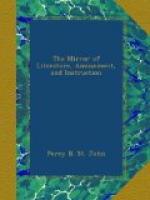Spinarosa. A princely pile! But ah! how nobler far its daring site! It rears its tow’rs amid these rocks and glaciers, As if proud man were in his might resolved To add his rock to those that spurn the vale.
Leon. All here is beautiful! but ’tis not home! ’Tis true I was a child scarce eight years old When led by Pietro into Italy— Yet are my home’s green lineaments as fresh As when first painted on my infant soul; This castle bears them not.—My home lay hid In the deep bosom of gigantic oaks, That o’er its roof their guardian shadows flung. Nor towers, nor gates, nor pinnacles, were there; With lowly thatch and humble wicket graced, Smiling, yet solitary, did it stand.
Blackwood’s Magazine.
* * * * *
IRISH SONGS.
It is impossible to conceive any trash more despicable than the slang songs which are current amongst the common people in Ireland; and this is the more to be lamented, as the extreme susceptibility of the people makes them liable to be easily moved to either good or evil by their songs. Even the native Irish songs, as we are informed in Miss Brooke’s Reliques of Irish Poetry, are sadly interpolated with nonsensical passages, which have been introduced to supply the place of lost or forgotten lines; and of humorous lyrical poetry, she says there was none in the language worth translating. Moore has given to the beautiful airs of Ireland beautiful words; but Moore is a poet for ladies and gentlemen, not for mankind. It may be, that there are not materials in Ireland, for a kindred spirit to that of Burns to work upon; but the fact is but too true, that the poor Irishman has no song of even decent ability, to cheer his hours of merriment, or soothe the period of his sadness. Honour and undying praise be upon the memory of Burns, who has left to us those songs which, like the breath of nature, from whose fresh inspiration they were caught, are alike refreshing to the monarch and the clown!—Ibid.
* * * * *
A REAL MIRACLE.
The fable of Dr. Southey’s Pilgrim of Compostella, is as follows:—
A family set forth from Aquitaine to visit the shrine of St. James, at Compostella, whither, according to the Catholic faith, the decapitated body of that saint was conveyed from Palestine, (miraculously of course,) in a ship of marble. At a certain small town by the way, their son Pierre is tempted by the innkeeper’s daughter. Like a second Joseph, he resists the immodest damsel; like Potiphar’s wife, she converts her love to hate, and accuses the virtuous youth of a capital crime. Her false oaths prevail, and he is condemned to the gallows. Rejoicing in his martyred innocence, he exhorts his parents to pursue their pilgrimage, and pray for the peace of his soul.




